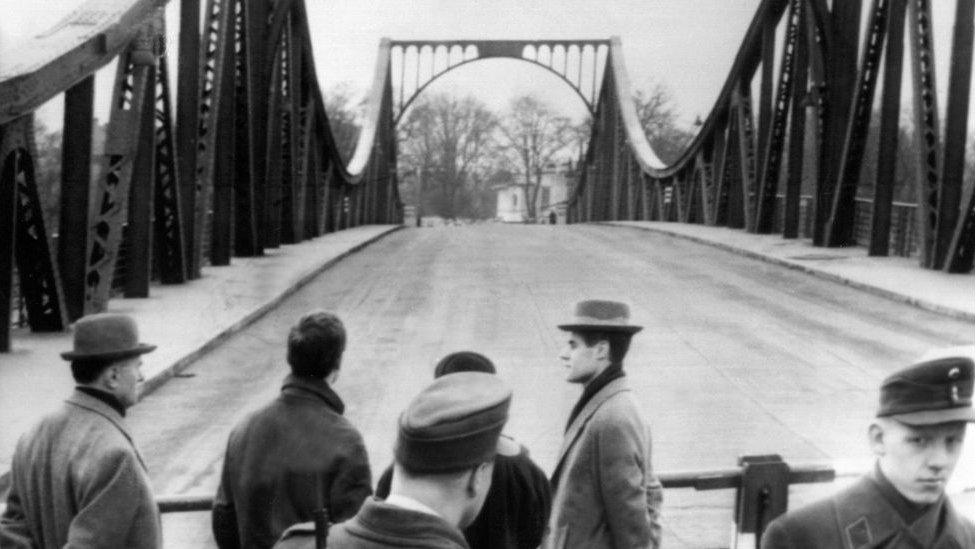Frank Meehan: Bridge of Spies cold warrior dies
- Published
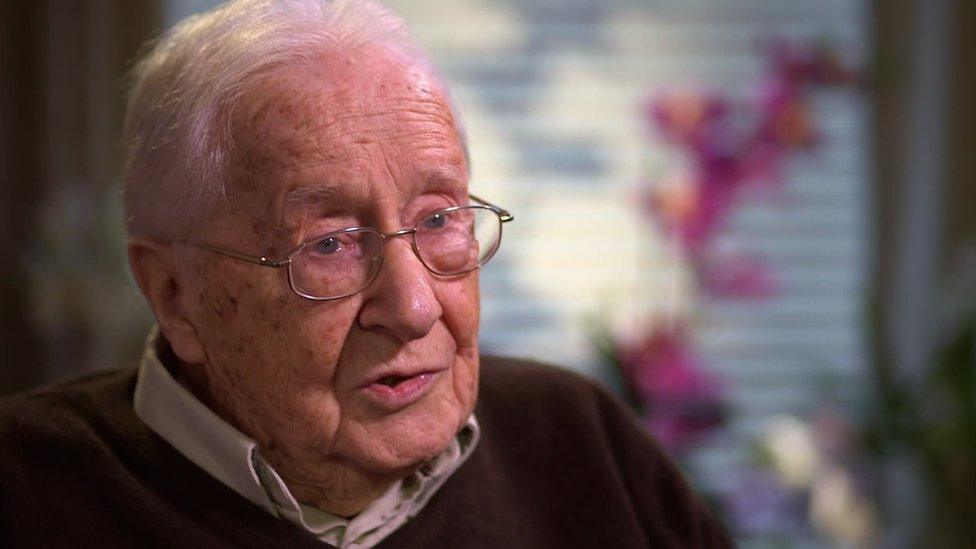
Frank Meehan has retired to Helensburgh on the west coast of Scotland after years as a Cold War diplomat
Frank Meehan, who has died at the age of 98, had an incredible life and played a key role in some of the most notable events of the Cold War - including the prisoner exchange which inspired the hit film Bridge of Spies.
Few people seeing pensioner Frank Meehan make his way through the Scottish west coast town of Helensburgh on his mobility scooter could have guessed at the life he had led.
This modest and unassuming man was a retired Cold Warrior, whose brilliant career in the US foreign service spanned almost the entire length of the east-west stand-off which so defined the 20th Century.
His parents were from Clydebank and moved to the US in hope of a better life in New Jersey. Francis John was born there on St Valentine's Day 1924.
This brought him US citizenship, a quirk of the US system which would play a key part in his life.
The family returned home to the Clyde when he was a young boy and the Second World War was a constant presence in his teenage years.
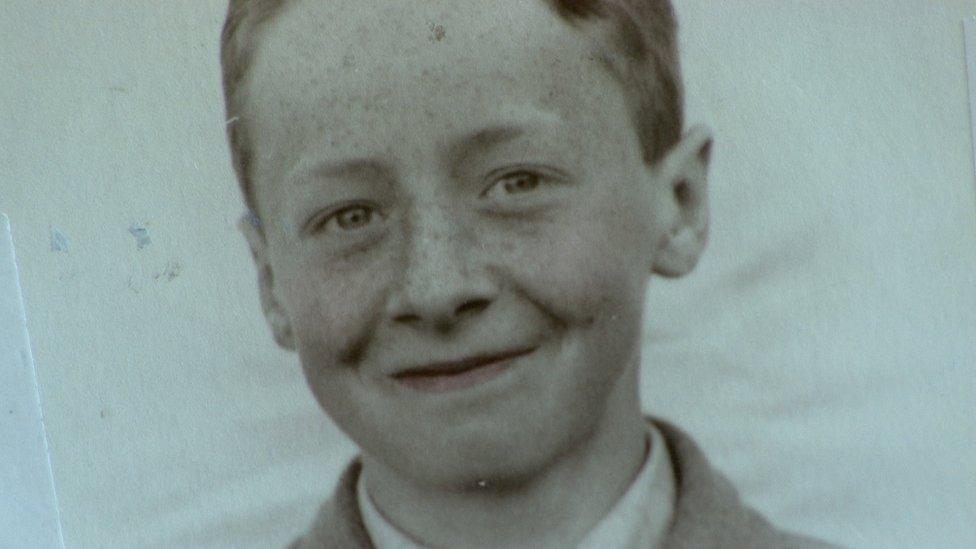
Frank was born in the US but grew up in Clydebank
He survived the Clydebank Blitz, an aerial bombardment by the Luftwaffe which killed 500 and destroyed thousands of homes.
"There was a bad attack on the shipyards in March 1941," he told a BBC documentary.
"I was 17. We were in a shelter and the bombing started quite far away but you could hear them getting closer. The house next door got incendiary-bombed and was destroyed.
"I worked clearing the rubble of houses that had been burned. I carried a bricklayer's hod. I was not much good at that. Maybe that's what made me think of the Foreign Service."
In fact, Frank attended the University of Glasgow and was embarking on a career in journalism when that US citizenship changed his life.
He was drafted in 1945 and spent two years in the US army, travelling across Germany and helping re-build the shattered country.
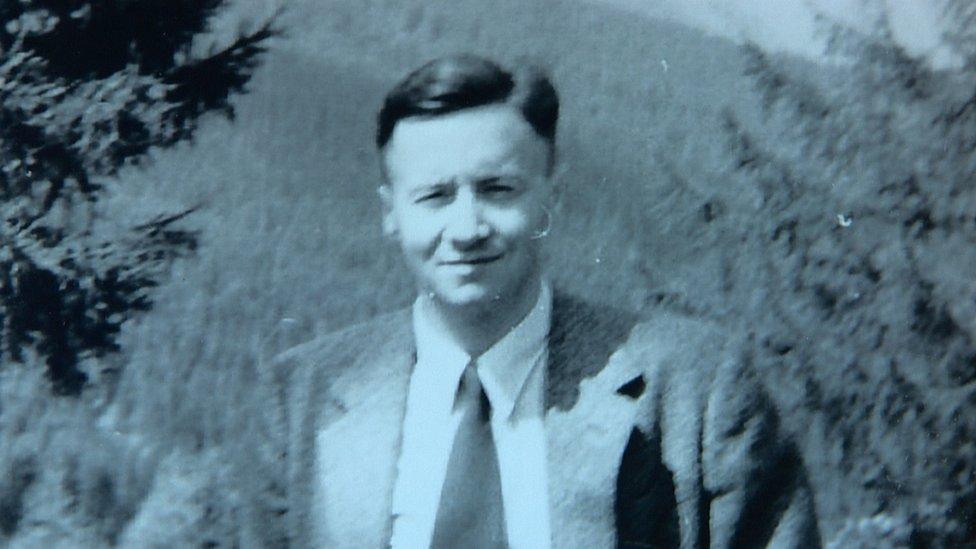
Frank Meehan joined the US State Department as a diplomat after the war
Towards the end of his time he responded to an advert for the US Foreign Service. He claimed it was to get a weekend off in Berlin.
In fact, he aced the exams and after a period in Washington DC working on the Marshall Plan - the US scheme to fund and coordinate the rebuilding of western Europe - joined the US State Department.
Like many of his generation, Frank's career was dominated by the Soviet Union. He became fascinated by what was then seen as the great enemy.
"I think once you get the Russia bug you never lose it," he said.
"Who are these people who had almost collapsed under German attack and then fought their way from Stalingrad to Berlin? I wanted to understand."
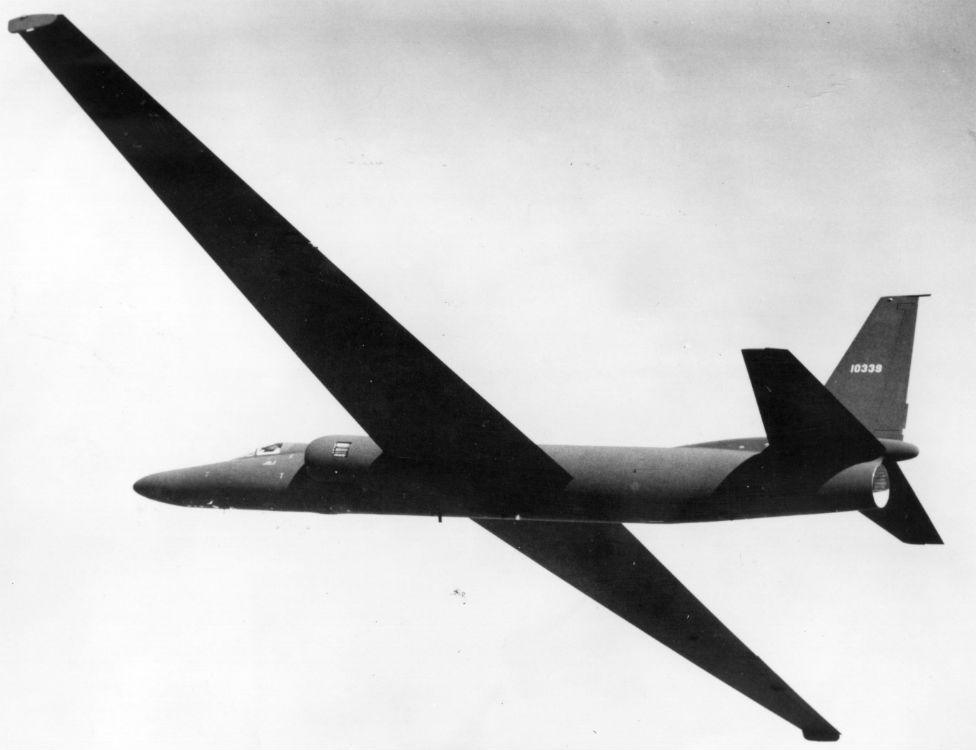
The U2 high flying spy plane developed by America
By 1960, he was based at the US embassy in Moscow when Soviet forces shot down a top secret US spy plane and captured its pilot Gary Powers.
The existence of the U2 spy programme had never been acknowledged by the US, so the Soviets put the wreckage on public display and the pilot through a show trial.
Frank was sent to take a look.
"I was pretty tense," he said.
"I thought there might be some kind of manufactured incident.
"But I went to the head of the long line of people waiting to view it and the Russian guard looked at my pass and grinned and said, in Russian: 'Be my guest! It's your plane after all'!"
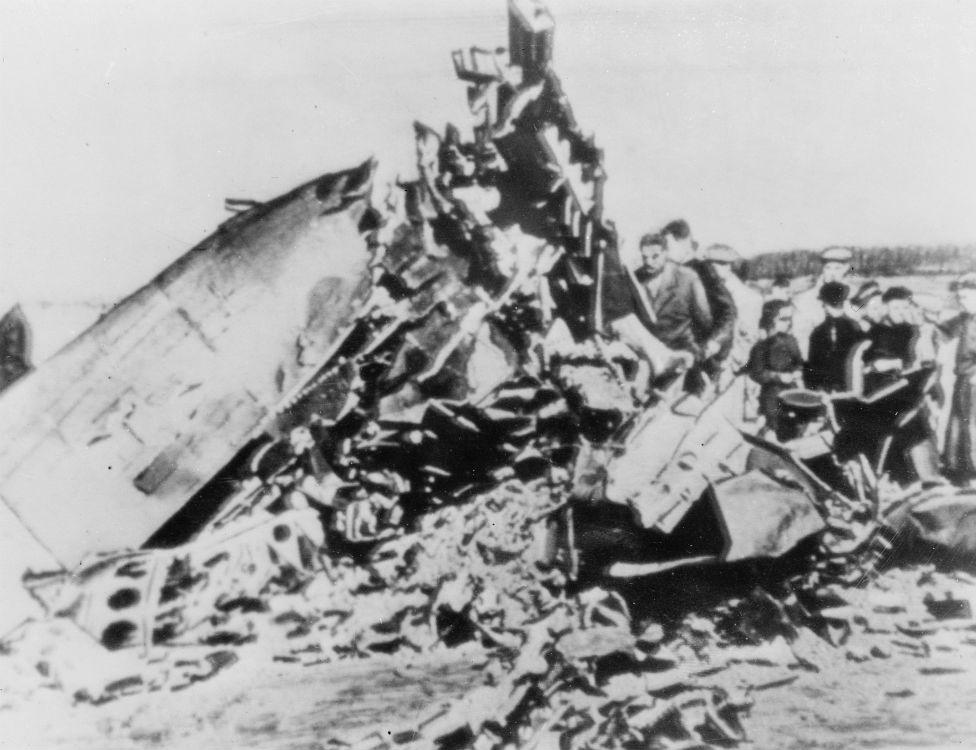
The remains of the U2 spy plane flown by American pilot Gary Powers, which was shot down over Soviet airspace
The imprisonment of Gary Powers would lead to perhaps the most dramatic and well-known incident in Frank's career, when he played a key part in the Bridge of Spies drama.
He was stationed in Berlin when Moscow offered to swap Gary Powers for a Soviet agent called Rudolf Abel, who'd been caught spying in Brooklyn.
The Americans also asked for the release of a young American student called Frederic Pryor as part of the deal.
Pryor had been studying in East Germany and had been arrested by the Communist regime there and accused of espionage.
The incident was dramatised by Steven Spielberg in the 2015 film Bridge of Spies, starring Tom Hanks.
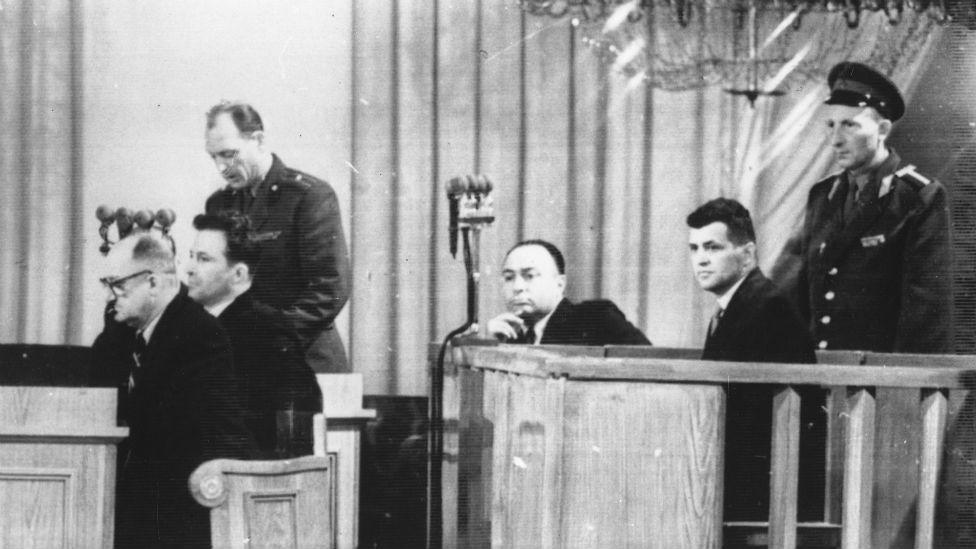
Gary Powers, accused of espionage over Russia in his U2 airplane, on trial in Moscow
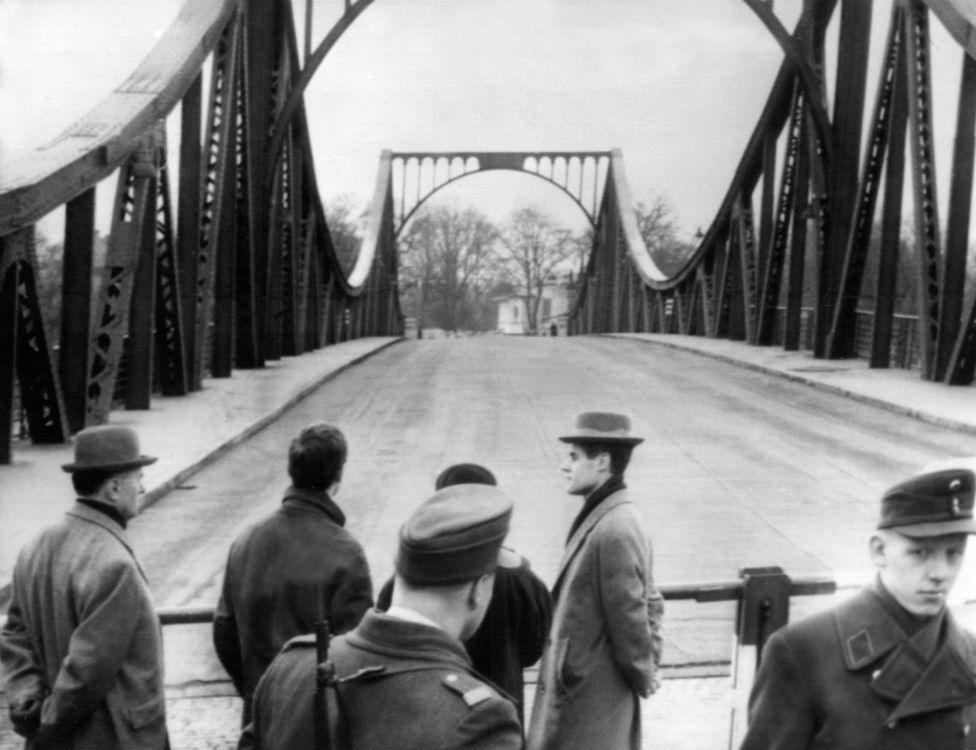
The Glienicke bridge in Berlin after US pilot Gary Francis Powers was swapped for Soviet spy Rudolf Abel in 1962
While Powers and Abel were swapped at the Glienicke Bridge, Pryor was handed over to Frank at Checkpoint Charlie in the centre of the city.
After a tense wait among what he called "East German goons", Frank walked Frederic Pryor to his freedom in the west.
None of Frank's part in this made it into the Hollywood version, which he regarded as well-made and "mostly" accurate.
Over the course of the next 25 years, Frank became US ambassador in Czechoslovakia, and then, in 1980, Poland.
He arrived in Warsaw right at the birth of Solidarity, the democracy movement that had emerged from strikes at the Gdansk shipyard.
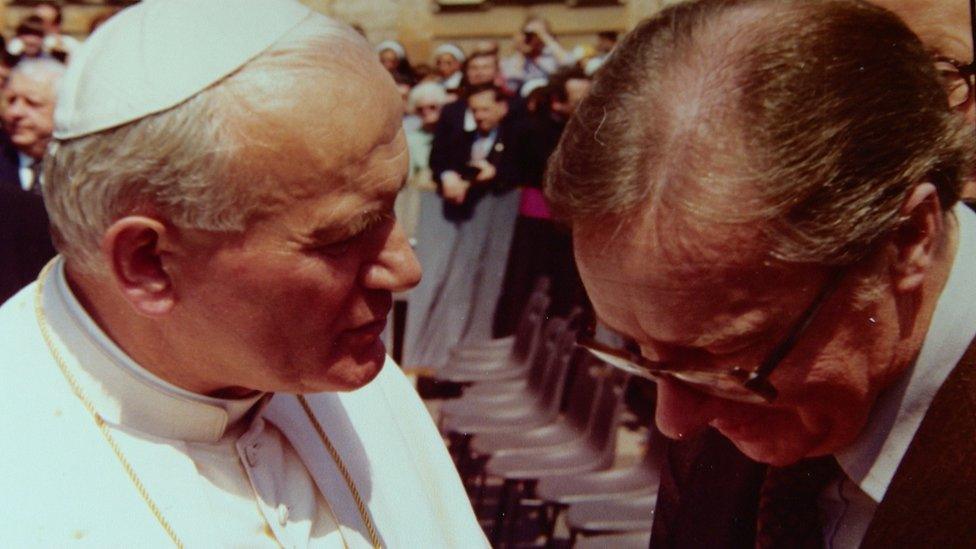
Frank met Pope John Paul II in his role as a US ambassador
He grew to admire the movement's leader, Lech Walesa, regarding him as a clever and moderate political operator.
His final posting as ambassador was to East Germany and he retired just a year before Communism crumbled across Europe.
He moved with his wife Margaret to Helensburgh, in what was their 23rd family home. They had four children.
In retirement, he remained puzzled as to why the Soviet regimes collapsed as they did.
He said: "I still have difficulty understanding exactly what happened to the Russians - why they decided to pack in and leave Eastern Europe. It's to me an inexplicable decision."
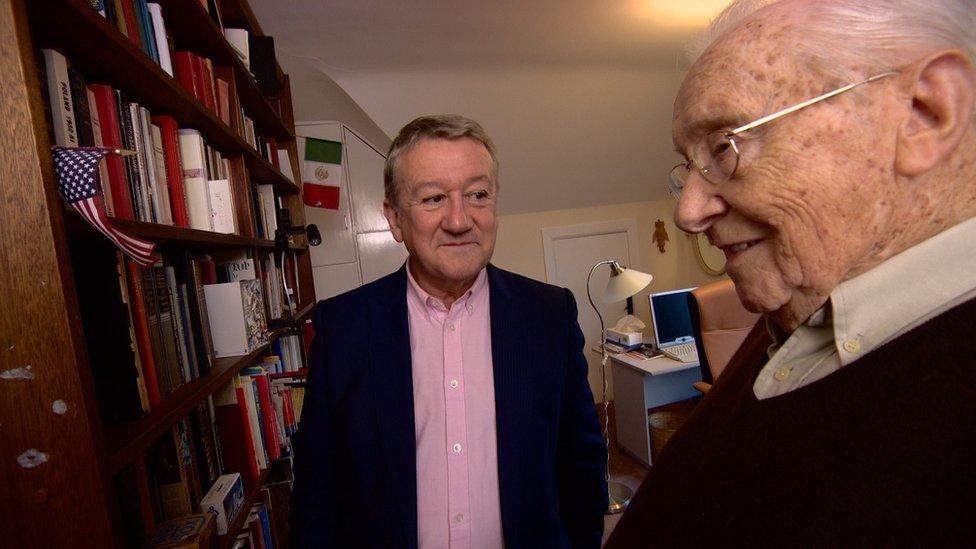
Margaret died in 2015. Two years later, Frank was the subject of a BBC Scotland documentary, Scotland's Cold Warrior, in which he looked back over his life with the journalist Allan Little.
By then into his 90s, he remained an astute critic of world affairs.
"What strikes me about Russia today is the tremendous sense of loss they have - of power and position.
"That explains Putin's hold over them. But Putin can't last forever.
"The more I look at Russia today the more I'm reminded of the last days of the Czars, Russia between 1900 and 1917."
They were the words of a diplomat and a man with a razor sharp analytical mind, qualities which took him right to the centre of the cold war.
He retired having made a major contribution to shaping the world which came after.
Related topics
- Published3 April 2017
